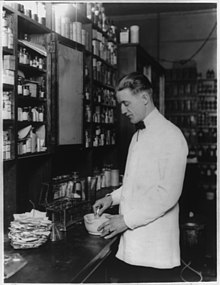
Back تركيب أدوية Arabic Fórmula magistral Catalan ئاوێتە CKB Eigenherstellung von Arzneimitteln German Fórmula magistral Spanish Préparation magistrale French Fórmula maxistral Galician Magistrale bereiding Dutch Lek recepturowy Polish Medicamento manipulado Portuguese

In the field of pharmacy, compounding (performed in compounding pharmacies) is preparation of custom medications to fit unique needs of patients that cannot be met with mass-produced products. This may be done, for example, to provide medication in a form easier for a given patient to ingest (e.g., liquid vs. tablet), or to avoid a non-active ingredient a patient is allergic to, or to provide an exact dose that isn't otherwise available. This kind of patient-specific compounding, according to a prescriber's specifications, is referred to as "traditional" compounding.[1] The nature of patient need for such customization can range from absolute necessity (e.g. avoiding allergy) to individual optimality (e.g. ideal dose level) to even preference (e.g. flavor or texture).
Hospital pharmacies typically engage in compounding medications for intravenous administration, whereas outpatient or community pharmacies typically engage in compounding medications for oral or topical administration. Due to the rising cost of compounding and drug shortages, some hospitals outsource their compounding needs to large-scale compounding pharmacies, particularly of sterile-injectable medications.
Compounding preparations of a given formulation in advance batches, as opposed to preparation for a specific patient on demand, is known as "non-traditional" compounding and is akin to small-scale manufacturing. Jurisdictions have varying regulations that apply to drug manufacturers and pharmacies that do advance bulk compounding.
© MMXXIII Rich X Search. We shall prevail. All rights reserved. Rich X Search